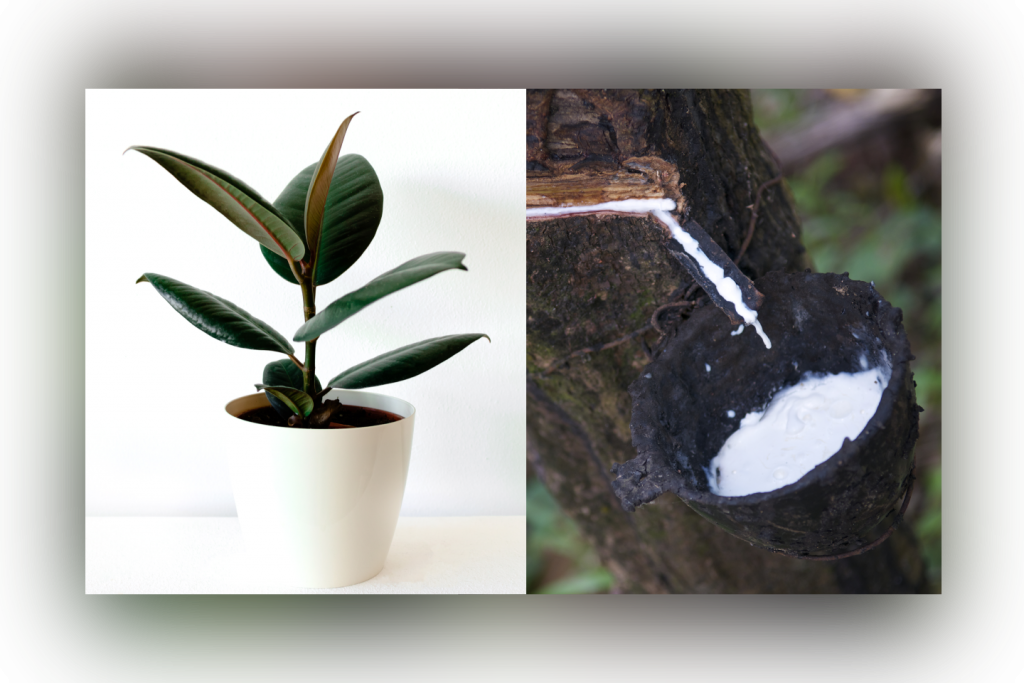Reasons to Use Latex or Rubber Gloves
 When cleaning the kitchen and especially the bathroom, you end up using chemical cleaners to disinfect and get that deep clean. This can really affect your hands. The best way to protect your hands is, of course, to put on a pair of gloves.
When cleaning the kitchen and especially the bathroom, you end up using chemical cleaners to disinfect and get that deep clean. This can really affect your hands. The best way to protect your hands is, of course, to put on a pair of gloves.
When looking at what to buy, you will often see two words. Rubber and latex.
Now right off the bat, you might say, “But latex is rubber”, and you’re right …sort of. So let’s clear this up.
Latex vs Rubber
Both originate from the rubber tree. Latex is the sap coming from the hevea brasiliensis (rubber) tree.
It is composed of extremely small particles of an insoluble liquid or solid material in a liquid.
Scientists eventually understood chemical properties and were then able to make synthetic versions. The word latex would be used as a general term for the physical and chemical properties.
Rubber is made from latex that has been dried and later processed to make materials flexible. It’s known for resilience and toughness.
Most of the rubber and latex used today are synthetic.
Generally speaking rubber and latex are used to describe the properties of the substance and can be of both natural or artificial origin.
Latex Gloves
Given that both latex and rubber have the same origin it is easy to see why they are still used interchangeably. From a commercial perspective with respect to gloves, we can refer to latex gloves as the more flexible and comfortable.
Rubber Gloves
When we refer to rubber gloves, we will refer to gloves, that are typically heavier and less flexible than their latex counterparts. These would be gloves that are generally for industrial use, that offer stronger chemical or puncture protection.
Why Use Latex / Rubber gloves
The most common reason you want to use latex gloves is for washing dishes. They will keep your hands dry, keep your sleeves from getting wet especially if they are extra long, improve grip even when they get wet, and even protect your manicure.
Wearing gloves is also helpful for household chores. They can keep the cleaning solutions away from your hands. Even mild solutions can be problematic with enough exposure according to WebMd. You will definitely want to use gloves when using stronger chemicals such as bleach or hydrogen peroxide.
Wearing gloves also plays an important role in minimizing exposure to germs that you come across when cleaning. This is important to remember when cleaning kitchens, bathrooms and toilets.
Another thing to keep in mind is they offer a layer of protection when handling abrasive or sharp material. For example washing kitchen graters or knives.
Not only can you protect your hands while washing dishes, but also when cleaning, the bathroom, cleaning the kitchen, polishing furniture, polishing silverware, cleaning blinds and shutters, mopping the floor, and cleaning the oven.
Apart from regular household chores, you will also want to wear gloves if you have to clean your pets. As much as you love your pet, you still want to be clean.
Keep in mind that you will want to have separate gloves for each type of task. For example
Caring For Your Gloves
You will want to make sure your gloves last as long as they can.
- Wash and rinse the gloves while wearing them
- Turn then inside out and repeat the above process
- Hang over the faucet or sink to dry, or use a kitchen glove stand
For more details see How to Clean and Take Care of Rubber and Latex Gloves.
Summary
Comparison table:
| Latex Gloves | Rubber Gloves | |
| Pros |
|
|
| Cons |
|
|
Benefits of gloves
- Keep hands dry when doing dishes
- Keep sleeves dry when doing dishes (if long enough)
- Helps to keep grip, even when wet
- Protects hands from exposure to household cleaning chemicals
- Minimizes exposure to germs encountered while cleaning
- Helps to protect your manicure
- Keeps dirt out of your fingernails
- Offers a layer of protection when handling abrasive or sharp materials
- Can be used for general household cleaning
- Can be used for cleaning pets
Now that you’re “armed” with the knowledge, all you need to do is to pick the right pair of gloves for you. Gloves may not be the most attractive looking when cleaning the home, but they are absolutely necessary to keep your hands soft and protected.
